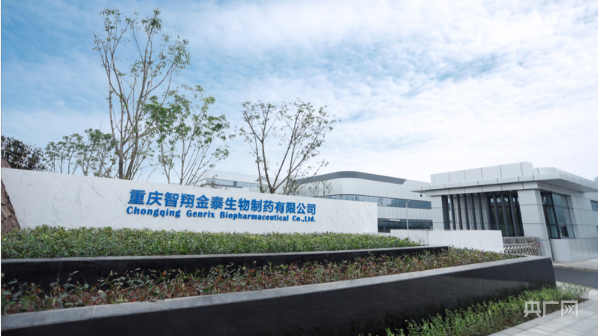Chongqing’s first Class 1 innovative biological drug is launched
August 31, 2024
Source: drugdu
 354
354
 On August 27, Chongqing's first Class 1 biological innovative drug, Celici monoclonal antibody injection, was approved for marketing, achieving a "zero" breakthrough in Chongqing's biological product innovative drug track. According to Zhixiang Jintai's official microblog, Celici monoclonal antibody injection is its first product approved for marketing and the first fully human IL-17A target drug in China. Indications for the birth of the "king of medicine"
On August 27, Chongqing's first Class 1 biological innovative drug, Celici monoclonal antibody injection, was approved for marketing, achieving a "zero" breakthrough in Chongqing's biological product innovative drug track. According to Zhixiang Jintai's official microblog, Celici monoclonal antibody injection is its first product approved for marketing and the first fully human IL-17A target drug in China. Indications for the birth of the "king of medicine"
Moderate to severe plaque psoriasis as an indication is regarded as the "Gold Coast" in the field of autoimmune indications. The former "king of medicine" Humira was born from it.
Due to the complexity of the psoriasis pathway itself, there are also many antigens that can be targeted in the pathway. The more typical one is the previous generation of "king of medicine" Humira. Adalimumab is a monoclonal antibody targeting TNF-α. This target has a wide range of adaptability for autoimmune diseases. Its indications range from ankylosing spondylitis to skin diseases, and then to rheumatoid arthritis. Its wide range of indications has made it the "king of medicine".
However, the benefit of TNF-α is that it can be used for a wide range of indications and has been proven to be effective in clinical practice. Later, ustekinumab, which targets IL-12 and IL-23, also played an important role in the treatment of psoriasis; but from a mechanistic point of view, they did not touch the key pathways in psoriasis - Th17 and IL-17A. For this reason, the next generation
of monoclonal antibodies focusing on psoriasis came into being. Secukinumab is the first fully human monoclonal antibody that specifically targets IL-17A. The original developer is Novartis. Its subcutaneous injection formulation was first launched in Japan in 2014 and was launched in Europe and the United States soon after; later, its intravenous injection formulation was approved for marketing by the FDA last year.
In China, Hengrui's Fulanizumab and Zhixiang Jintai's Celicimab have always been in a trend of catching up with each other. Both are in the status of application approval for listing. Now, both have been approved for listing on the same day - August 27, and are about to face the next more intense commercial competition.
Sikuchiyu's "challenger"
Zhixiang Jintai's Celicimab has always been highly anticipated by the market, and its clinical progress has also been widely concerned by the pharmaceutical industry and investors. In
March 2021, the first subject was enrolled in the Phase III clinical trial of Zhixiang Jintai Celicimab for moderate to severe plaque psoriasis, and the Phase III clinical trial was completed in the fourth quarter of 2022 (ChiCTR2100043223). Its Phase III clinical study was led by Professor Zhang Jianzhong of the Department of Dermatology, Peking University People's Hospital. The final results showed not only gratifying efficacy, but also good safety and tolerability. In February of this year, its Phase III clinical results were officially published in the British Journal of Dermatology (IF=11), an authoritative international journal of dermatology.
According to the Phase III clinical trial of Celicimab, a total of 420 patients were included, 281 in the experimental group and 139 in the control group. In terms of clinical endpoints, the proportion of subjects who achieved PASI 75 at week 12 in the 200mg injection group of celecoxib was 90.7% (8.6% in the placebo control group), and the proportion of subjects who achieved clear/almost clear skin lesions (PGA 0/1) was 74.4% (3.6% in the placebo control group), confirming that the clinical trial endpoints were reached.
In addition, in terms of secondary clinical endpoints, the PASI 90 response rate at week 12 in the trial group was 74.4%, the PASI 75 response rate at week 52 was 96.5%, the PASI 90 response rate was 84.1%, and the PGA0/1 response rate was 83.7%, maintaining a high level of skin lesion improvement and achieving sustained treatment response, which was also very good.
In terms of the proportion of PASI 100 (complete remission), 30.2% of the subjects achieved complete remission at week 12, and by the end of the 52-week trial, this number reached 59.7%.
Such clinical results make it fully qualified to challenge celecoxib in the subsequent commercialization process.
https://news.yaozh.com/archive/4 4113.html
By editorRead more on
- Gan & Lee Pharmaceuticals’ new PROTAC drug GLR2037 tablets have been approved for clinical trials to enter the field of prostate cancer treatment March 3, 2026
- AideaPharmaceuticals plans to raise no more than 1.277 billion yuan through a private placement to focus on the global clinical development of innovative HIV drugs March 3, 2026
- Giant Exits! Its Star Business Acquired March 3, 2026
- Focusing on cardiovascular and cerebrovascular diseases! OpenMediLead Medical Intelligence Dual Engines Launch Internal Testing, Connecting Drug Development and Clinical Diagnosis in a Closed Loop March 3, 2026
- Innovent Biologics Announces Approval of New Indication for BTK Inhibitor “Pitubrutinib” in China March 3, 2026
your submission has already been received.
OK
Subscribe
Please enter a valid Email address!
Submit
The most relevant industry news & insight will be sent to you every two weeks.



